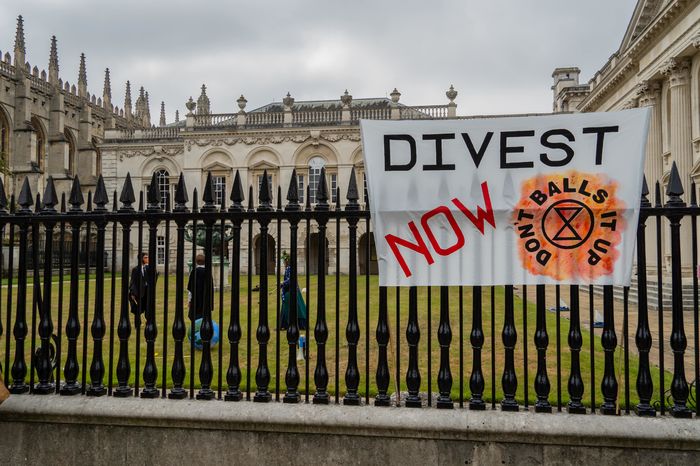Academics divided over delay to fossil fuel vote
In a discussion of a proposal to stop the University from accepting fossil fuel funding, academics disagreed over the effect it would have on academic freedoms and the impact it would have on the climate crisis

Senior academics are deeply divided over a decision by the University Council to delay a vote on stopping the University from accepting funding from fossil fuel companies.
In July, a Grace was proposed by 84 members of the Regent House, saying the University should not accept research funding from a company if it is constructing new fossil fuel infrastructure, exploring new fossil fuel reserves or a member of trade associations involved in “political lobbying against science-based climate legislation.”
The Grace system allows academics to vote on matters involving the governance of the University, if a proposed measure receives the support of 50 members of the Regent House, and is not blocked by the University Council.
In October, the University Council declared that they “share the desire implicit in the Grace to address the climate emergency as a matter of urgency”, but delayed a vote on the proposal as they seek to “explore, and give proper consideration to, the full implications of these changes”.
The Council has commissioned a study to analyse the impact of the proposals, focusing on potential challenges to academic freedom and the ability of the University to fill gaps in funding.
Following this decision, a discussion involving academics and students was held by video conference last month (22/11), presided over by deputy vice-chancellor Simon Franklin.
During the discussion, a clear dividing line emerged between academics who support the delay to the vote on the proposal to end fossil fuel ties and those who oppose it.
Professor Lucy Delap, a member of the History faculty, described the outcome as a “shamefully slow response to a fast-paced emergency” and said that the University appear “to be on the side of those who are seeking to dilute or delay” responses to climate change.
Delap compared the University’s response to an earlier time when “May Balls were flooded by tobacco products in ways that we would now think of as totally unacceptable”.
Professor Jason Scott-Warren, from the English Faculty, agreed and said that the Grace posed “no threat to academic freedom nor to the University’s funding”.
Scott-Warren, who operates as an activist for Extinction Rebellion, told the assembled academics: “We should not be in any doubt by this stage that the fossil fuel industry is immoral; or that it is, to all intents and purposes, evil”.
Scott-Warren criticised the University for “throwing in its lot with the fossil fuel companies desire for a protracted and lucrative energy transition”. He concluded by remarking that the University “seems to be incapable of acting on that science and demanding transformative change”.
Other academics also criticised the Council’s decision, including Professor Mary Laven, chair of the History faculty, who said: “It is peculiar and disturbing that the University has denied members of the Regent House their right to vote on this Grace. I suppose the lobbyists have shown their strength once again.”

University Council delays vote on fossil fuel funding
Despite this criticism from many academics, however, later in the discussion there were speeches in support of the delay, particularly from members of STEM departments.
Dr Alex Copley, from the Earth Sciences department, spoke in support of the delay and argued that interconnections in the global economy mean “the proposed Grace would prevent Cambridge from engaging with many of the organisations which can affect positive change”.
Professor John Dennis, head of the School of Technology, said: “I do not believe the strategy of divestment, as outlined in the Grace, will have the slightest effect on that ultimate goal [decarbonisation]. In fact, it will make things much worse, because the reach and influence of the University will be rapidly diminished as the lifeblood is drained from its energy research”.
Other academics agreed with the idea that the Grace would stop collaboration with some organisations who can help to achieve net zero targets. Ten members of the Earth Sciences department agreed with the notion that “preventing all collaboration with such industries will severely impact our ability to make substantial contributions towards the 1.5 degree goal”.
Lewis Westwood Flood, an HSPS undergraduate student, also spoke at the discussion. He criticised the student member of the council, Sam Carling, for supporting the delay to the vote and suggested that he reconsider his assessment of the issues involved.
The Council asked to receive the University’s report as early as possible in the upcoming Lent Term, and said they wanted to make sure that members of the University are able to fully engage with the discussion going forwards.
 News / CUP announces funding scheme for under-represented academics19 December 2025
News / CUP announces funding scheme for under-represented academics19 December 2025 News / Cambridge welcomes UK rejoining the Erasmus scheme20 December 2025
News / Cambridge welcomes UK rejoining the Erasmus scheme20 December 2025 Comment / Yes, I’m brown – but I have more important things to say22 December 2025
Comment / Yes, I’m brown – but I have more important things to say22 December 2025 News / SU reluctantly registers controversial women’s soc18 December 2025
News / SU reluctantly registers controversial women’s soc18 December 2025 Film & TV / Timothée Chalamet and the era-fication of film marketing21 December 2025
Film & TV / Timothée Chalamet and the era-fication of film marketing21 December 2025








